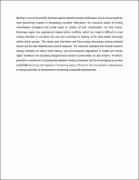| dc.contributor.author | Namutebi, Estellina | |
| dc.date.accessioned | 2018-08-29T08:14:14Z | |
| dc.date.available | 2018-08-29T08:14:14Z | |
| dc.date.issued | 2017 | |
| dc.identifier.citation | Namutebi, E., 2017. Eco-socio Impact of Mineral Resource Mining in the Karamoja Region of Uganda. Journal of Science and Sustainable Development, 6(1), pp.57-76. | en_US |
| dc.identifier.uri | https://www.ajol.info/index.php/jssd/article/view/159415 | |
| dc.identifier.uri | http://hdl.handle.net/20.500.12280/580 | |
| dc.description.abstract | Mining is one of the prolific activities geared towards poverty eradication, but an elusive goal for most government leaders in developing countries. Oftentimes, the economic aspect of mining overshadows ecological and social needs in context of host communities. For that reason, Karamoja region has experienced violent ethnic conflicts, which has made it difficult to trust mining activities to transform the area and contribute to healing of the deep-seated animosity within ethnic groups. This study used interviews and focus group discussions among artisanal miners and the data obtained was content analysed. The outcomes indicated that mineral resource mining activities are still in their infancy, yet environmental degradation is visible and human rights violations and escalating disagreements between communities are also evident. Therefore, peaceful co-existence is a prerequisite between mining companies and the Karamajong to achieve sustainable eco-socio development in Karamoja region. Moreover, the local people‘s participation in mining activities is instrumental in achieving sustainable development. | en_US |
| dc.language.iso | en | en_US |
| dc.publisher | Journal of Science and Sustainable Development | en_US |
| dc.subject | Eco-socio | en_US |
| dc.subject | Mineral resource | en_US |
| dc.subject | Mining | en_US |
| dc.subject | Karamajong | en_US |
| dc.title | Eco-socio Impact of Mineral Resource Mining in the Karamoja Region of Uganda | en_US |
| dc.type | Article | en_US |


